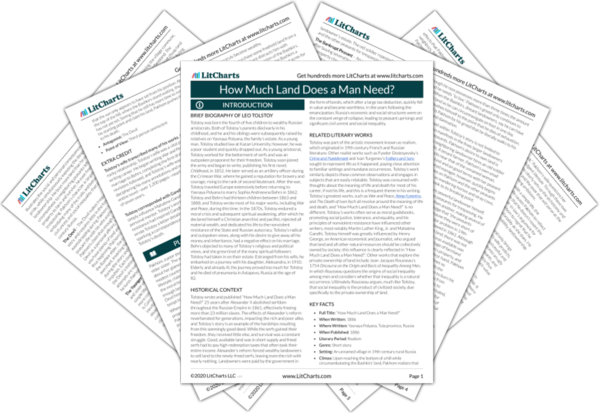Tolstoy’s portrayal of death in “How Much Land Does a Man Need?” is powerful and absolute, and no amount of land or material wealth can protect Pakhom from its reach. Yet when death comes for Pakhom during his attempt to walk the Bashkirs’ land, he repeatedly disregards it and shows surprisingly little fear. It is not simply greed that blinds Pakhom to the danger he is in, however, but also his own pride. Pakhom refuses to heed warnings of death and seems to fear the shame of losing his new-found material wealth and social standing more than his own wellbeing. By linking pride and death, Tolstoy suggests that the former, like greed, is a corrupting influence that leads only to ruin and moral decay. What’s more, the finality of death becomes the ultimate insult to Pakhom’s pride, as it renders all of his efforts toward obtaining and flaunting wealth meaningless.
Death first appears in the form of an omen in Pakhom’s dream the night before he walks the Bashkirs’ land. Pakhom sees himself in his dream, wearing only a shirt and trousers, dead on the ground at the foot of the Devil. He wakes in a cold sweat, yet his only response to this disturbing imagery is to note, “The things one dreams about!” Pakhom is too consumed by his greed and excitement about securing as much land as possible to pay attention to what his dream may actually mean.
As Pakhom walks the perimeter of land he hopes to purchase from the Bashkirs’, he sheds his outer coats, shoes, and excess clothing under the strain of the sun. He walks until the “heat had exhausted him, his bare feet were cut and bruised, and his legs were giving way.” Even as Pakhom begins to physically resemble the dead version of himself from his dream, he still does not heed its warning. By the time Pakhom finally makes the connection between his dream and his greedy behavior, it is too late. As he reaches the top of the hill where his cap marks his starting point, Pakhom “remembered the dream and he groaned. His legs gave way, he fell forward and managed to reach the cap with his hands.” Pakhom’s ominous dream is his last thought before he dies, reinforcing its importance. Pakhom’s foolishness suggests the depth of his pride, as he fails to grant any weight to this clear omen of his own doom.
It is in large part this pride that keeps Pakhom from forfeiting the Bashkirs’ land. Pakhom’s initial fears as his body begins to deteriorate are focused on losing the valuable land, rather than on death. Pakhom’s “fear made him only more breathless,” Tolstoy writes. “On he ran…” To Pakhom, it seems, returning to the village commune to live among the other peasants is a fate worse than death. Even when Pakhom finally does admit the fear that death is upon him, this proves no match for his fear of being made a fool. Pakhom states, “If I stop now, after coming all this way–well, they’d call me an idiot!” He knows that his body cannot possibly take much more abuse, yet he continues to push himself past the breaking point, worrying he will lose face with the other villagers.
At the moment Pakhom realizes that he is most definitely dying, he does not scream or cry. Instead, as he collapses, his behavior is controlled and composed. At this point, Pakhom knows that he has secured his land; as such, his extreme fear of living the life of a peasant fades, and along with it his earlier panic and breathlessness subside. He is left with only his lesser fear of death, which he meets with a mere groan. Through Pakhom, then, Tolstoy highlights the short-sighted futility of pride.
Pride, much like greed, is at the root of Pakhom’s problems. Pakhom’s pride is wounded when his sister-in-law insults his life as a peasant, and his fear of returning to such an allegedly shameful life after obtaining land only serves to fuel his greedy behavior. By focusing at the end of his life on what other villagers will think, rather than the reality of his desperate situation, Pakhom privileges pride above the finality of death. To do so, Tolstoy’s story argues, is deeply foolish. “How Much Land Does a Man Need?” thus also suggests the ultimate triviality of human being’s material concerns in the face of their inevitable loss.
Death and Pride ThemeTracker

Death and Pride Quotes in How Much Land Does a Man Need?
“It's true what you say,” he said. “Take me. Ever since I was a youngster I've been too busy tilling the soil to let that kind of nonsense enter my head. My only grievance is that I don't have enough land. Give me enough of that and I'd fear no one—not even the Devil himself!”
And then Pakhom saw that it wasn't the peasant, but the Devil himself, with horns and hoofs, sitting there laughing his head off, while before him lay a barefoot man wearing only shirt and trousers. When Pakhom took a closer look he saw that the man was dead and that it was himself.
On and on he went—but there was still a long way to go. He started running and threw away his coat, boots, flask, cap, keeping only the spade which he used for leaning on. “Oh dear,” he thought, “I've been too greedy. Now I've ruined it. I'll never get back by sunset.”
Although he feared death, he could not stop. “If I stopped now, after coming all this way—well, they'd call me an idiot!” So on he ran until he was close enough to hear the Bashkirs yelling and cheering him on.
Pakhom's workman picked up the spade, dug a grave for his master—six feet from head to heel, which was exactly the right length—and buried him.











